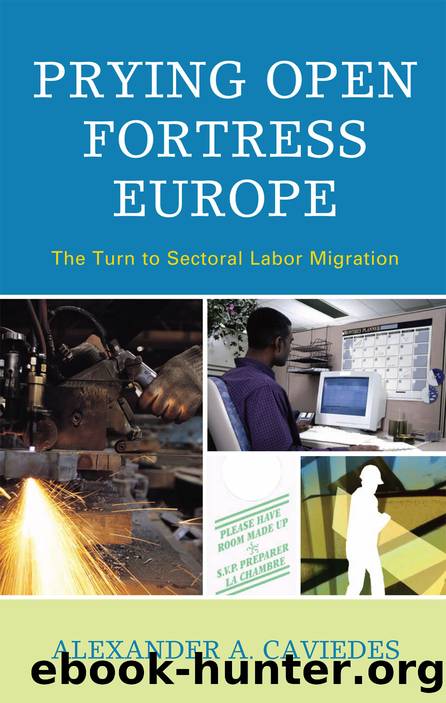Prying Open Fortress Europe by Caviedes Alexander;

Author:Caviedes, Alexander;
Language: eng
Format: epub
ISBN: 978-0-7391-3321-7
Publisher: Lexington Books
SPECIAL RECOGNITION OF LOW SKILL NEEDS IN HOSPITALITY
Though the growth of the British hospitality industryâs labor force from 1993 to 2002 did not match that of Germany, the increase of 17 percent outpaced the 11 percent overall growth of the general labor market (Eurostat 1993, 2002). Even after the downturn in the global economy following the burst of the dot-com bubble, the tourism-damping effects of the SARS virus, and September 11th, the United Kingdom continued to experience labor shortages in the hospitality industry (Burns 2003).
Aliens (the British term for non-Commonwealth foreigners) played an increasingly important role in the hospitality labor force in the 1950s, when the percentage of all permits issued to hotels and restaurants rose from 7 to 13 percent within five years. Though this is considerable growth, the largest number of aliensâover 40 percentâwere still employed in domestic service at this time (Unit for Manpower Studies 1977, 97). Together with the fact that less than 15 percent of permit holders went to industry and commerce, this is a clear indication that either the business communityâs needs were satisfied by Commonwealth workers, or that industry was not yet adept at utilizing the mechanism of the work permit. In the 1960s, the reliance of the hospitality industry on work permits progressed relentlessly, to the point that in 1971, 36 percent of all permits were issued to workers in hospitality, a larger percentage than went to industry and commerce (and far larger than domestic services which had shrunk to less than 16 percent of permits).
The progressing reliance on foreign labor in hospitality was halted with the passage of the 1971 Immigration Law and the accompanying provision that unskilled labor no longer qualified for work permits. These provisions were phased in gradually after January 1, 1972, so that the number of permits going to hospitality declined rapidly from the highpoint of 21,633 in 1970, to a mere 6,669 four years later (Unit for Manpower Studies 1977, 67).20 Employers, however, were able to weather this policy turnabout since it occurred roughly in concert with the United Kingdomâs entry into the European Economic Community. So although the work permit avenue had been curtailed, 14 percent of the workforce in hospitality remained foreign-born. This was the highest percentage for any sector, even higher than in the next most âforeignâ branch: national health care. The industry was able to take advantage of accessionâin 1974, one out of every four EC workers in the United Kingdom was employed in the hotel and catering industryâyet this did not completely satisfy the demand for labor in the industry, and so a separate contingent of permits continued to be reserved for unskilled hotel and restaurant workers.
By 1983, the percent of hospitality workers who were foreigners had declined to between 4 and 5 percent where it remained until the mid-1990s (SOPEMI 1984, 24; SOPEMI 1995, 36). In 1994, only 320 permits were granted to workers in hospitality, representing a paltry 1 percent of the total permits issued. However, the strong economic
Download
This site does not store any files on its server. We only index and link to content provided by other sites. Please contact the content providers to delete copyright contents if any and email us, we'll remove relevant links or contents immediately.
Adding Value to Policy Analysis and Advice by Claudia Scott; Karen Baehler(457)
Sociological Perspectives of Health and Illness by Constantinos N. Phellas(445)
Race and American Political Development by unknow(442)
American Government and Politics Today by Steffen W. Schmidt Mack C. Shelley Barbara A. Bardes(430)
Human and Global Security : An Exploration of Terms by Peter Stoett(426)
Control Of Oil - Hardback by Kayal(409)
Entrepreneurship Education and Training: The Issue of Effectiveness by Colette Henry Frances Hill Claire Leitch(370)
The Catholic Church and European State Formation, AD 1000-1500 by Jørgen Møller(357)
Materializing the Middle Passage by Jane Webster;(356)
The World According to China by Elizabeth C. Economy(345)
Left Is Not Woke by Susan Neiman(329)
Theories of Counseling and Psychotherapy: A Case Approach by Nancy L. Murdock(316)
Turkey's Relations with the West and the Turkic Republics: The Rise and Fall of the Turkish Model by Idris Bal(315)
Cross-Cultural Child Development for Social Workers by Lena Robinson(310)
Japan's Ainu Minority in Tokyo by Mark K. Watson(297)
Advances in Child Development and Behavior, Volume 37 by Patricia J. Bauer(297)
Laboratory Life by Bruno Latour(294)
Beyond Service: State Workers, Public Policy, and the Prospects for Democratic Administration by Greg McElligott(285)
The Oxford Handbook of Museum Archaeology by Stevenson Alice;(276)
